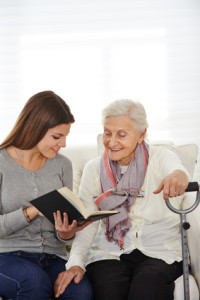
Update: In the years since I wrote this, I’ve realized that “elderly” can be seen as an ageist term. I now know that “older adult” is a better term. Still, the fact remains that people find these posts almost daily, years later, because they’re searching for “reading aloud to the elderly.” So I’m leaving the title intact, but highlighting the fact that these days, our terminology differs.
You may wonder why I think it necessary to address the question of “how” to read aloud to older people, particularly frail older people. Open the book, open your mouth, and read, right?
Well, yes, those are the basics, but there are things you can do to enhance the experience and make it more comfortable for both of you.
Choose your material carefully, with the needs, interests, and cognitive level of the person uppermost in your mind. (Of course, if you’re asked to read a letter they’ve received, or the daily newspaper, just go with it.)
Talk with the person ahead of time. What would they like you to read? As we age, we lose more and more autonomy and freedom of choice, so if they can participate in the selection of reading material that will mean a great deal.
Practice ahead of time. Be sure you can be heard. Most elderly people have some level of hearing impairment. At the same time, be aware of roommates. They may or may not want to listen in.
With the hearing and roommate issues in mind, sit close to the person you’re reading to. Remember that in closeness there is also a feeling of intimacy and security. Physical closeness can be as important to a lonely person as the sound of your voice reading.
These elements are important for children who want to read to an elderly person as well.
When talking with the person about selection of reading material, see if they remember their favorite books from their childhood. If the book(s) is/are available (and at the child’s reading level), it can be a great experience for both elder and child to share a book like this.
Practice with the child ahead of time, rehearsing vocal clarity and expression as well as volume. Sometimes it isn’t that they need to shout to be heard, but they need to enunciate their words clearly.
Keep in mind that sometimes high-pitched sounds become harder to hear as people age, so it’s doubly important that children make sure they say their words clearly.
Be open to the older person helping the child with their reading. Some elderly people would love to be read to — but would also be delighted to encourage the child with the difficult words, and talk with them about what they liked to read when they were young.
Be alert for signs that attention is waning, or the elderly person is tiring. They may even drift off to sleep — this is perfectly okay. Neither the elder nor you need to feel embarrassed about this. It happens. Reading sessions will likely be short. That’s okay, too.
Above all, relax and allow this to be a special time for both of you. Enjoy!
To see my suggestions about what to read, see October’s post.
To see my thoughts about why to read to the elderly, see September’s post.


Excellent points Beth!
Thanks, Darlene!
You’ve made some wonderful points, Beth! Thank you!
Great post!